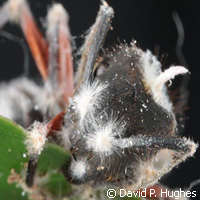Scientists discover new rainforest zombie ant-fungi
Researchers in Brazil, the UK and the US have discovered four new Brazilian species in the genus Ophiocordyceps unilateralis (O. unilateralis), a fungal pathogen specific to ants of the Camponotini tribe. Presented in the journal PLoS ONE, the newfound fungus is not one but four distinct species with 'mind control' over ants. The research was funded in part by the ANT FUNGI EP ('From ecology to mechanisms of the extended phenotype') project, which clinched a Marie Curie Action grant worth EUR 214 000 under the Seventh Framework Programme (FP7). The fungi are members of the 'zombifying' fungi that infect ants and control their behaviour, according to authors Dr Harry Evans and Dr David Hughes of the UK's Centre for Agricultural Bioscience International (CABI) and the University of Exeter respectively. The ants are killed after the fungi find a prime location to dispose of the spores. The study reveals that all four species are highly specialised on one ant species. They also have a set of adaptations and spore types that guarantee infection. It should be noted that the fungi's developmental process is complex. They infect, control and kill ants before growing spore-producing stalks from their heads. That is, when the fungi infect the ants, the ants yield their bodily control. So the fungi take over, forcing the ants to scatter towards an area that allows the fungi to grow and spread their spores. 'Differences in the functional morphology of all the spore stages within each species reflect the ecology of the ant host, and these are so pronounced that molecular characterisation is not required to separate them,' the authors write. 'However, DNA (deoxyribonucleic acid) has been recovered from the new species and will be sequenced together with planned collections from across the tropics to obtain an overall picture of diversity within O. unilateralis.' Researchers could use this latest information to determine how fragmentation affects disease dynamics. 'We are only just beginning to understand the taxonomy and ecology of the Ophiocordyceps unilateralis species complex associated with carpenter ants; macroscopically characterised by a single stalk arising from the dorsal neck region of the ant host on which the anamorph occupies the terminal region and the teleomorph occurs as lateral cushions or plates,' the researchers write. 'Each of the four ant species collected - Camponotus rufipes, C. balzani, C. melanoticus and C. novogranadensis - is attacked by a distinct species of Ophiocordyceps readily separated using traditional micromorphology. The new taxa are named according to their ant host.' The paper provides key insight on undiscovered, complex, biological interactions in habitats currently under threat. According to the researchers, the four new species come from the Atlantic Rainforest of Brazil, which is designated a World Biosphere Reserve containing a large number of highly endangered species like woolly spider monkeys and marmosets. This area is the world's most degraded biodiversity hotspot, and 92% of its original coverage has been destroyed, either by the farming of sugar cane or by urban settlements. Experts recognise that biodiversity loss has a major impact on the community structure, but there is still a lack of information about how parasites, including the zombie-inducting fungi, deal with fragmentation.For more information, please visit: PLoS ONE:http://www.plosone.org/home.actionCABI International:http://www.cabi.org/University of Exeter:http://www.exeter.ac.uk/
Countries
United Kingdom, United States



